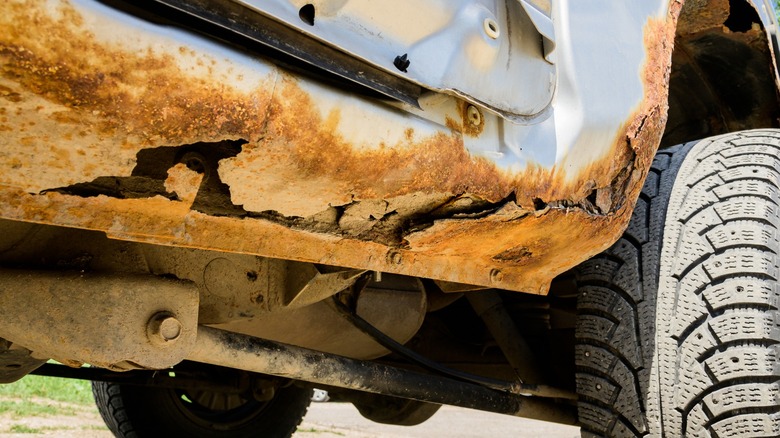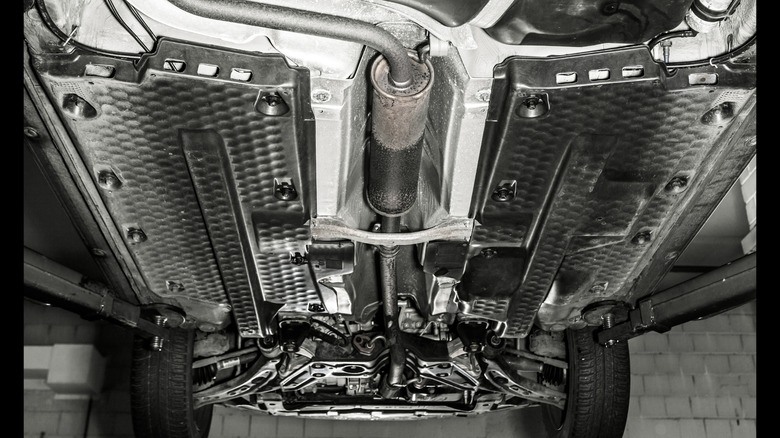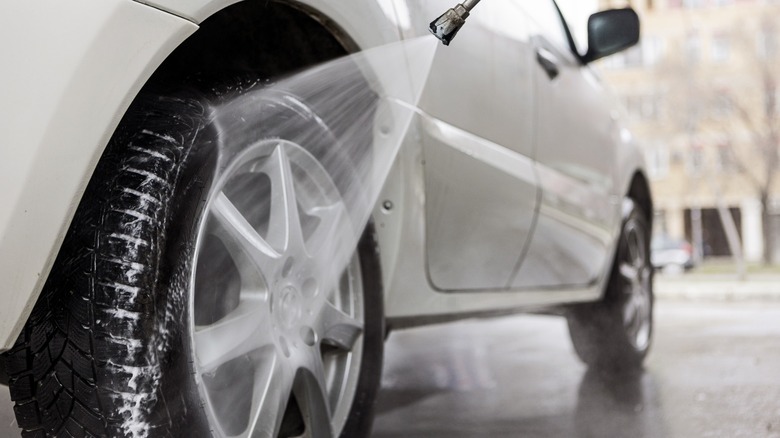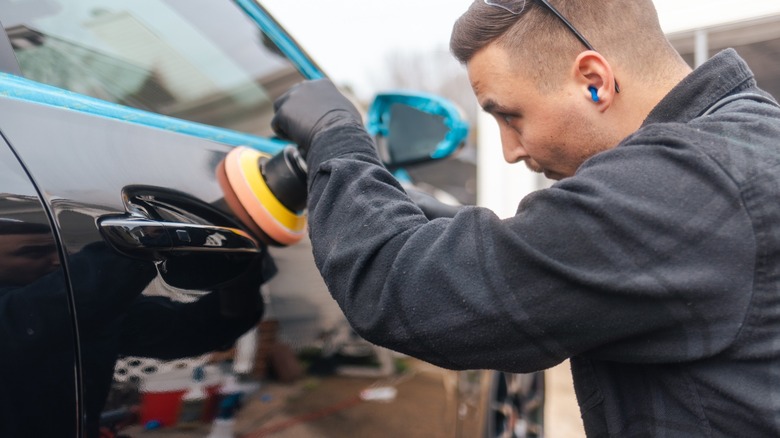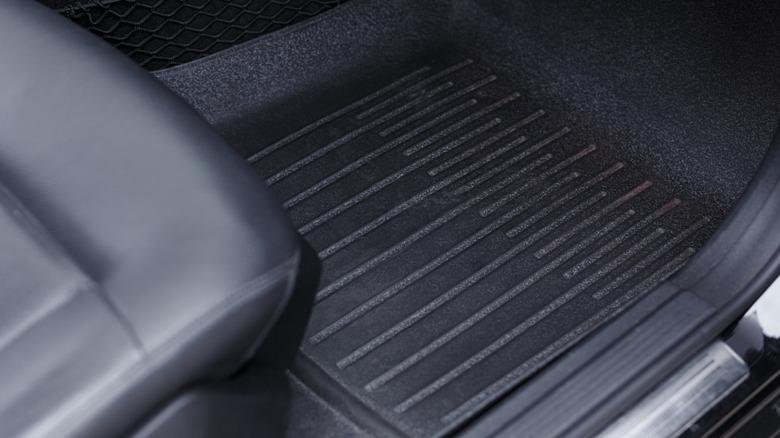5 Ways To Protect Your Car From Rust
Taking good care of your car can become increasingly difficult, depending on where you live. The most prominent example is that some areas are more likely to cause your car to rust than others. The Rust Belt covers parts of the Northeastern and Midwestern United States and tends to cause cars to rust fairly rapidly. However, virtually anywhere that uses salt on the roads during the winter or experiences a lot of moisture can cause your car to rust all around, too. Rust on your car can cause continuous damage to body panels and, in much worse cases, suspension and drivetrain components. Sure, there are solutions in the realm of fixing rusty components, but your best bet is to fend it off before it gets a chance to happen.
While the obvious solutions may be to keep your car stored through the winter or to move somewhere that's less likely to cause your car to rust, those aren't exactly feasible options for many folks. It doesn't have to be so black and white. After all, the creation of rust is nothing more than a chemical reaction. When you mix moisture and oxygen with iron, you get iron oxide. With that quick chemistry re-cap out of the way, here are five tips to help prevent your car from rusting throughout the winter.
Apply an undercoating to your car
Applying an undercoating to your car is one of the best preventative measures for rust aversion. An undercoating is a substance sprayed on the bottom of your car and suspension components, preventing moisture from getting into the metal. Without the moisture, oxidation is not possible. In an ideal world, all buyers of new cars would apply rust-protective undercoating to their vehicles before corrosion has a chance to start. However, if your car is already rusting and you're looking to prevent it from getting worse, it's not too late.
There are a couple of different types of undercoatings. One category is rubberized or wax-based products that act as a preventative shield for your car's important components. These are ideally used when the car is new. However, in the case of a car that's already starting to experience some surface rust, oil-based undercoating is the best answer. Oil-based undercoating penetrates deep into the metal and evacuates the moisture, stopping the rusting process in its tracks and preventing it from starting again.
Savvy DIY-ers can apply undercoatings. However, professional installation options are a good idea. This is especially true for a rubberized coating, as accidentally going too heavy on underside hardware could make working on your car a nightmare for your future self or mechanic. Overall, though, good undercoating is a great way to prevent rust on your suspension, exhaust, and chassis components.
Regularly pressure wash the underbody
If it isn't evident by now, the underside is the most important portion of your car to keep rust-free. Rust under your paint or a fender rusting away at the ends is annoying, but rusty suspension components can be life-threatening. In addition, rust-destroying components on your exhaust system can lead to its failure. If you rust through your catalytic converter, you can get a check engine light, fail emissions testing, etc. So, we're mainly highlighting preventative methods for your car's undercarriage.
One of the easiest solutions is to ensure you're regularly pressure-washing the underside of your car entirely. Whether you have a pressure washer of your own or have to venture to a do-it-yourself car wash, it is important to keep your car's rust-prone components free of salt and other deposits from the road. Ensuring you're properly rinsing the entirety of the underside of your car with special attention paid to exhaust components and suspension can go a long way in preventing corrosion.
Wax your car
You're likely already aware that routinely waxing your car a few times a year can keep the paint looking shiny and new. However, it can also prevent your car's body from rusting. Your car's factory clear coat acts as a defensive layer between the metal that makes up the body and outside moisture or corrosive materials. So, keeping it in tip-top shape is essential. One of the best ways to keep your paint healthy is with regular waxing. How often you wax your car depends on what type of wax you use. So, read the instructions on the bottle.
Without waxing, your car's clear coat can eventually dissipate from exposure to the sun's UV rays. Once the clear coat is gone, the porous paint underneath can allow moisture to pass right through to your vehicle's metal. Many manufacturers use galvanized steel body panels, which act as one last line of defense against moisture and rust. With enough time, though, it'll get through. So, take good care of your paint.
Get any chips or body damage repaired
A simple rock chip or light fender bender can act as the starting point for a total rust takeover when it comes to your car's body components. The same principle as above applies. Once the protective clear coat and paint layers are gone, moisture is free to make its way into your metal body components. However, this process can be extremely expedited in the case of bad rock chips or crash damage since there's no slow decay. Instead, it's a wide-open offering to the rust gods.
Sure, it may not seem like that much of a detriment if a tiny stone chip starts to rust. However, it's worth keeping in mind that once rust is in a metal component, there's no going back. Moreover, the rust can spread throughout the entirety of the metal component underneath any paint, clear coat, or wax if you give it an entry point. So, while bodywork and paint repair are not cheap, it's typically a lot cheaper than buying new body panels. After all, you'd likely still need to get those new panels painted. If they're small enough, touch-up paint pens can be all you need to repair chips or scratches and stop a rusty nightmare altogether.
Buy rubber floor mats
This one might not be as obvious, and while most modern cars have some form of protection on the chassis' floor pan, nothing is guaranteed or bulletproof in this world. So, it's best to take preventative measures. If you live in an area where you get a lot of snow or rain, your shoes could be the driving force behind a rusty disaster beneath your feet. Water soaking into the carpet will eventually make its way down to your car's metal chassis. If left untreated, especially if your shoes carry salt or other corrosive anti-icing chemicals, you could wind up with rust. A simple solution to prevent that moisture from making its way into and through your carpet is a set of rubber floor mats.
There are a handful of companies that make universal rubber floor mats that are rather affordable. In addition, if you want to spring for a higher-end offering, some companies offer custom-fit options for virtually any car. A great example is WeatherTech, whose mats are made with precise interior measurements of cars for guaranteed fitment. They are, however, quite expensive for floor mats. Overall, though, whether you spring for the more expensive option or not, much like many things on this list, this initial investment can ultimately save you thousands in repairs in the future.
